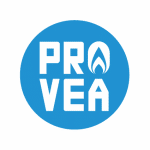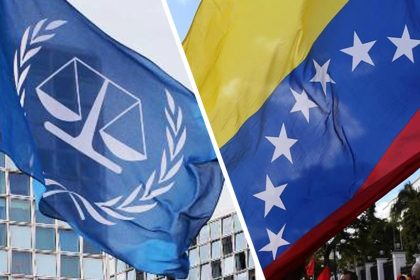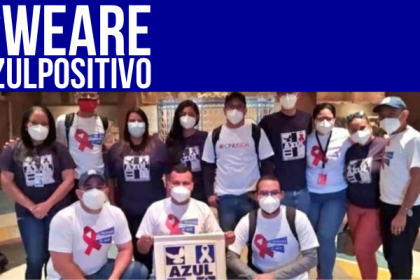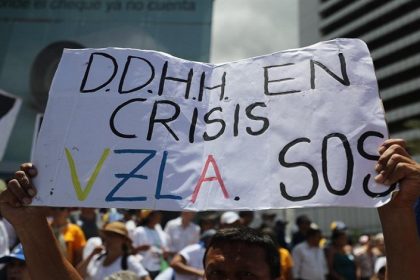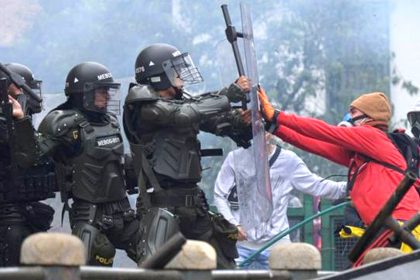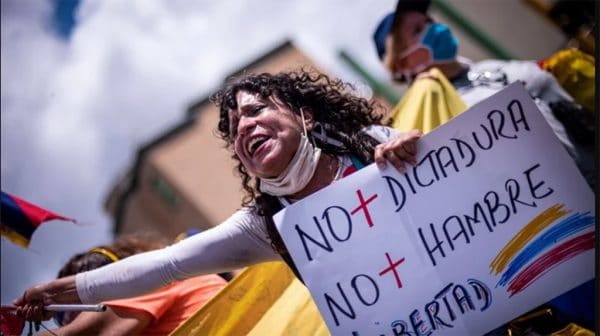
As Venezuela’s crisis of authoritarianism deepens, civil society voices are increasingly coming under attack by the de facto government of Nicolás Maduro. On March 30, the Venezuelan Ministry of Interior and Justice published a new requirement in the Official Gazette for the registry of “natural and legal entities” under the Organic Law Against Crime and Terrorism, obligating all non-governmental organizations (NGOs) and non-profit organizations in the country to provide sensitive information regarding their activities, contributions, and beneficiaries. For example, under its broad definition of “beneficiaries,” the measure establishes the alarming requirement that humanitarian and human rights NGOs reveal the identities of the victims and vulnerable communities that they serve. This action is a clear effort to monitor and limit the work of independent civil society organizations, which under Venezuelan law are already required to register with the state.
This measure is the latest in a string of actions intended to restrict and intimidate civil society organizations, especially those that receive support from international donors. In October 2020, the Maduro government issued a resolution requiring international NGOs seeking to operate within Venezuela to register “activities to be carried out in the territory of the Bolivarian Republic of Venezuela,” and their intentions. Shortly thereafter, the government’s Superintendency of Venezuelan Banking Institutions (Sudeban) announced on November 20, 2020 that it would require all financial institutions in Venezuela to monitor all business and financial operations carried out by non-profit organizations in the country. The criteria issued on March 30 are an extension of these efforts to restrict, intimidate, and potentially criminalize independent civil society organizations in Venezuela.
We are also concerned by reports that the National Assembly inaugurated in January has introduced legislation that may further restrict the activities of civil society organizations in Venezuela, and the rights of human rights defenders. On April 15, the Committee on Foreign Relations, Sovereignty and Integration proposed a “Law of International Cooperation” in the National Assembly, which has already passed the first round of debate in the Committee. Though the text of this legislation has not been made public, the signing organizations anticipate that this legislation will likely impose additional restrictions on the ability of NGOs in the country to access international funding for their activities, as did a similar “Law on International Cooperation” proposed in 2015.
The threat of these restrictions and registration requirements is very serious given the harassment, intimidation, and arbitrary detentions that civil society and NGO actors in Venezuela have faced in recent months. On January 12, five human rights defenders of the Venezuelan NGO Azul Positivo, which works to provide assistance to those living with HIV/AIDS and other sexually transmitted illnesses, were arbitrarily detained and held for nearly a month under unsubstantiated charges of money laundering and terrorism financing. These charges have yet to be dropped after the defenders’ conditional release on February 10, leading independent United Nations rights experts to call on the Venezuelan authorities to “stop continuous and increasing attacks and intimidation against civil society organizations and journalists in the country.” Dozens of civil society organizations across Venezuela have similarly faced intimidation and threats such as public accusations and defamation, the freezing of bank accounts, arrest warrants, and raids on NGO offices by the security forces. Between January and March 2021, the Centro de Justicia y Paz (CEPAZ) recorded 215 instances of persecution and criminalization by the Maduro government. This pattern has also been denounced by UN High Commissioner for Human Rights Michelle Bachelet. On February 22, the High Commissioner announced that her office had “documented at least 66 cases of intimidation, harassment, disqualification and criminalization of journalists, media outlets, human rights defenders, humanitarian workers, union leaders and members or supporters of the opposition” since September 2020. Several organizations alerted the Inter-American Commission on Human Rights in a public hearing about the criminalization of human rights defenders and civil society organizations and its acceleration in the current context.
As organizations devoted to defending human rights in the Americas, we are deeply concerned by this development and urge the Venezuelan authorities to comply with their international human rights obligations and immediately cease the repression and harassment of independent Venezuelan civil society. We call on the international community and all relevant United Nations bodies and agencies to actively support civil society organizations, human rights defenders, humanitarian workers, and other activists in Venezuela, and to ensure that their steady persecution is not met with indifference. Venezuela urgently needs a peaceful, democratic solution to its political, humanitarian, and human rights crisis, which will not be possible without an active and independent civil society pushing it forward.
Organizaciones firmantes:
- Acceso a la Justicia, Venezuela
- Acción Solidaria, Venezuela
- Alerta Venezuela, Venezuela
- Asociación Civil Fuerza, Unión, Justicia, Solidaridad y Paz (FUNPAZ), Venezuela
- Asociación Civil Más Ciudadanos, Venezuela
- A Todo Pulmón, Venezuela
- Aula Abierta, Venezuela
- Aquí Cabemos Todos, Venezuela
- Centro de Estudios Sociales y Culturales (CENSO-C), Venezuela
- Civilis Derechos Humanos, Venezuela
- Comité de Defensa de los Derechos Humanos de los Adultos Mayores, Pensionados, Jubilados y Discapacitados, Venezuela
- Coordinadora de Lucha Vecinal Lara, Venezuela
- DefiendeVenezuela, Venezuela
- DPR-Lara, Venezuela
- Epikeia Derechos Humanos, Venezuela
- Espacio Público, Venezuela
- Fundación Iribarren Lucha, Venezuela
- Fundación Lucelia, Venezuela
- Fundación para el Debido Proceso (Fundepro), Venezuela
- Movimiento Ciudadano Dale Letra, Venezuela
- Observatorio Electoral Venezuela (OEV), Venezuela
- Observatorio de Derechos Humanos de la Universidad de los Andes, Venezuela
- Observatorio Hannah Arendt, Venezuela
- Observatorio Venezolano de Prisiones, Venezuela
- Organización StopVIH, Venezuela
- Programa Venezolano de Educación-Acción en Derechos Humanos (PROVEA), Venezuela
- Promoción, Educación y Defensa en Derechos Humanos (PROMEDEHUM), Venezuela
- Proyecto de Extensión Visibilización y Educación en DDHH de la Face, Venezuela
- Red de Activistas Ciudadanos por los Derechos Humanos (REDAC), Venezuela
- Una Ventana a la Libertad, Venezuela
- Unión Cívica Nacionalista, Venezuela
- Urgent Action for Democracy and Development, Venezuela
- Venezuela Diversa AC, Venezuela
- Asociación Nacional de Familiares de Secuestrados, Detenidos y Desaparecidos del Perú (ANFASEP), Perú
- Asociación Por la Vida y la Dignidad Humana (APORVIDHA), Perú
- Asociación Pro Derechos Humanos, Perú
- Asociación Servicio Educativo para el Desarrollo y la Solidaridad (SEDYS) de Trujillo, Perú
- Asociación Servicios Educativos Rurales (SER), Perú
- Centro Loyola Ayacucho, Perú
- Centro de Promoción y Defensa de los Derechos Sexuales y Reproductivos (PROMSEX), Perú
- Comisión de Derechos Humanos (COMISEDH), Perú
- Comisión de Derechos Humanos de Alto Huallaga (CODHAH), Perú
- Comisión de Derechos Humanos de Ica, Perú
- Comisión de Derechos Humanos de Moyobamba, Perú
- Comisión de Derechos Humanos de Pucallpa, Perú
- Comisión de Justicia Social de Chimbote, Perú
- Comisión de Solidaridad Desarrollo y Justicia (COSDEJ), Perú
- CooperAccion, Perú
- Coordinadora Nacional de Derechos Humanos, Perú
- Derechos Humanos y Medio Ambiente (DHUMA), Perú
- Fundación Ecuménica el Desarrollo y la Paz, Perú
- Instituto de Defensa Legal, Perú
- Instituto Runa de Desarrollo y Estudios sobre Género, Perú
- Instituto Sur Andino de Derechos Humanos (ISADH) de Puno, Perú
- Lesbianas Independientes Feministas Socialistas (LIFS), Perú
- Movimiento Manuela Ramos, Perú
- Movimiento JATARISHUN, Perú
- Paz y Esperanza, Perú
- Comisión Colombiana de Juristas, Colombia
- Fundación Brisas del Norte, Colombia
- Venezolanos en Barranquilla, Colombia
- Abogadas y Abogados para la Justicia y los Derechos Humanos, México
- Comisión Mexicana de Defensa y Promoción de los Derechos Humanos, México
- Revista Digital Inalienable, Ecuador
- Venezolanos en Guayaquil, Ecuador
- El Centro para la Apertura y el Desarrollo de América Latina (CADAL), Argentina
- Oficina Jurídica para la Mujer, Bolivia
- Conectas Dereitos Humanos, Brasil
- Asociación Pro-Búsqueda, El Salvador
- Equipo de Reflexión, Investigación y Comunicación, Honduras
- Activados Panamá, Panamá
- International Service for Human Rights (ISHR), Suicia
- Canada Venezuela Democracy Forum, Canadá
- Centro por la Justicia y el Derecho Internacional (CEJIL), Internacional
- Comisión Internacional de Juristas, Internacional
- Human Rights Watch, Internacional
- Instituto Internacional sobre Raza, Igualdad y Derechos Humanos, Internacional
- Red Jesuita con Migrantes LAC, Internacional
- Robert F. Kennedy Human Rights, Internacional
- Women’s Link Worldwide, Internacional
- América Diversa, EE.UU.
- Coalición por Venezuela, EE.UU.
- Derechos Humanos con DR, Corp., EE.UU.
- Fe en Venezuela, EE.UU.
- La Oficina en Washington para Asuntos Latinoamericanos (WOLA), EE.UU.
- Venezuelans and Immigrants Aid, EE.UU.
